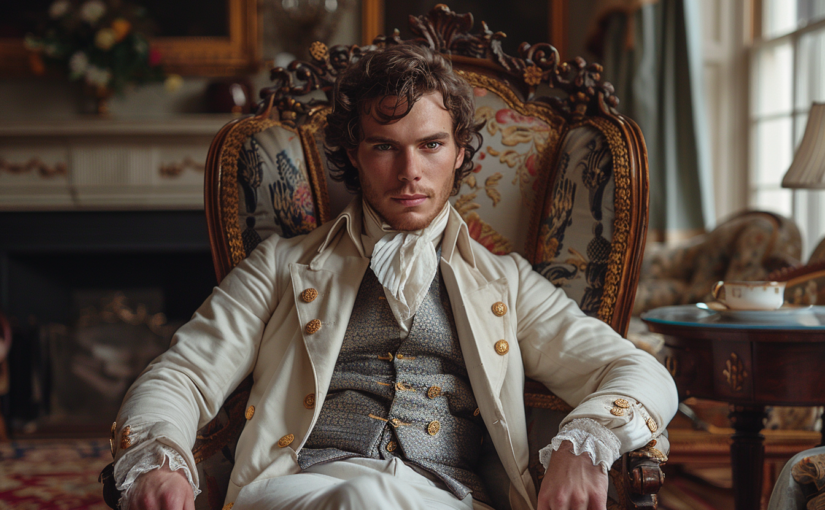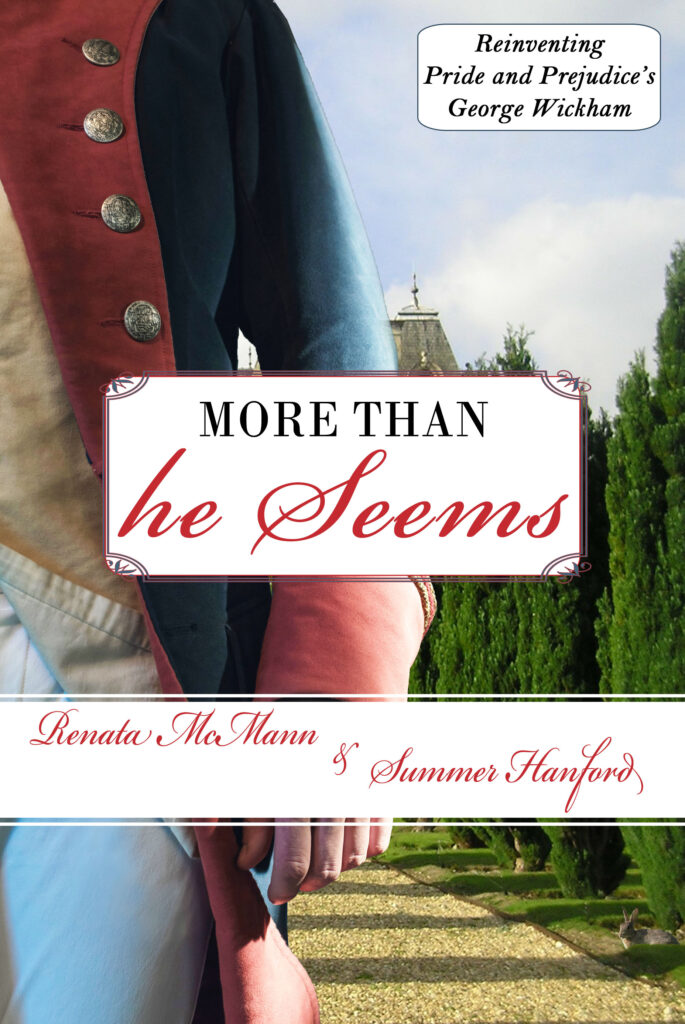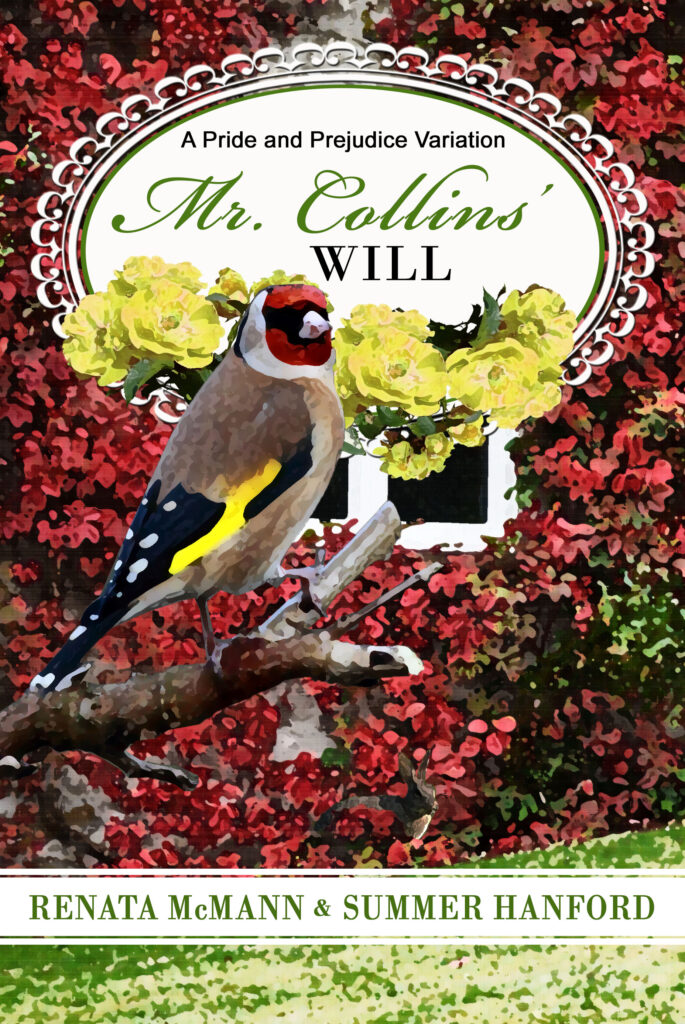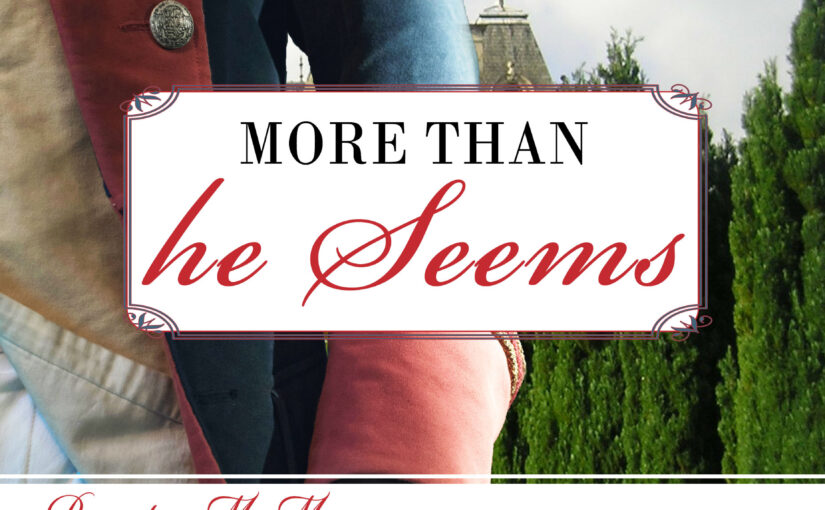When Does a Story Begin?
Summer Hanford and I will soon be publishing More Than He Seems, which is a story about Mr. Wickham, who is the hero in our book, not a villain. Wickham’s story is essentially true to Pride and Prejudice but there are justifications for his actions which don’t contradict the plot of Pride and Prejudice. Since Wickham’s relationship with Darcy is an important part of the story, we could hardly start the story with Wickham’s appearance in Pride and Prejudice. Wickham doesn’t appear until after more than thirty percent of the novel, and most of the Wickham/Darcy relationship took place before the novel started.
So where should the story begin? Hamlet is an example of a story where the starting place might not be considered the logical one, although, of course, being written by Shakespeare, it was the right place to start for his story. An extremely simplified summary of Shakespeare’s Hamlet is that Hamlet receives some evidence that Claudius murdered Hamlet’s father.[i] Hamlet spends most of the play trying to confirm the story and it goes badly. The play doesn’t start with Claudius murdering Hamlet’s father, because that is not the story that is being told. The story isn’t about the murder, but about Hamlet deciding whether it was a murder, along with Claudius trying to thwart him.
Darcy says Wickham went to Cambridge. It is likely Darcy did also. We assume they were roommates. We also assume that this is where Wickham’s life takes a very different direction.
Chapter One
The pub to which I’d been directed was a little too far from the college for Cambridge students to frequent. I didn’t mind the long walk and appreciated the anonymity the removed location gave me. It would be unfortunate if word got back to Darcy, or anyone else at university, that I’d been seen with the gentleman who’d asked to meet me.
I’d dressed carefully, deliberately looking just a little shabby. Although I boxed reasonably well, fenced better than most, and carried a pistol I knew how to use, I had no illusions those skills made me safe in the neighborhood in which my destination stood, huddled among other slightly disreputable, dilapidated establishments. Out front, I paused to take in peeling paint, a sign faded into illegibility, and two cracked stone steps leading to the door. I drew a steadying breath and headed in.
It took me a moment to pick out the man who’d asked me there. He’d swapped his regimentals for the garb of a workman. Dirt stained both hands and face. He sat alone, appearing to brood over a pint. I appreciated his care. I didn’t want to be remembered. No one liked a snitch. I had become one.
I strode over and straddled the bench across the table from him saying, “There you are,” as if we’d planned to meet, which we had.
Richard Fitzwilliam looked up from his pint to meet my gaze with hard, piercing eyes. “You’re early.”
“So you are,” I pointed out.
He nodded and fished in his pocket to pull out a dirt stained, ragged looking page of a newspaper, folded into an envelope. He pushed it across the table. Movements casual, as if nothing of much importance rested inside, I picked it up. The bills concealed by that much abused page felt crisp and new through the worn paper. Trusting Fitzwilliam enough not to count, I slid the enveloped into my coat pocket, not wanting to call attention to it.
Once my payment was out of sight, I waved over a serving girl and ordered a pint. After all, it would look suspicious to immediately get up and leave. As she walked away, I turned back to the colonel. “Thank you.”
He took a sip from his tankard. “It should likely be the other way around.”
I shrugged. Part of me felt good about what I’d done. Deserving of thanks. Part of me didn’t.
He kept his gaze on me. His eyes seemed to see right into me and read my soul. “I need to speak with you about your expenses.”
“You didn’t pay me what we agreed?” I said, chagrinned. I should have counted, calling attention to the bills be damned. If anything, I’d saved money for my King and Country. The serving girl returned to thunk a tankard down before me, but I didn’t look up at her. To have my compensation docked stung.
Before I could, Fitzwilliam fished out a few coins for the girl, waiting until she departed again to say, “No, I did not pay what we agreed. I added a bit. The expenses you reported weren’t enough. You must have spent more to gain Lenox’s trust.”
Fitzwilliam thought I deserved more? I savored the feeling, permitting a grin. “I didn’t spend more. I won.”
“You won?” the colonel said incredulously. “Your instructions were to lose.”
I took a swig of what proved to be very bitter ale. “I got the information. What do you care how I did it?”
“But…” Fitzwilliam paused, expression a touch baffled. “How did you do it?”
Around us, the noise picked up. The workday had ended. More and more laborers and tradesmen filed into the pub by the moment, the air growing thick with their sweat. “By essentially breaking even.”
“Breaking even?” Fitzwilliam prompted.
I couldn’t help it. My grin grew a bit smug. “Well, actually, I came out ahead by three shillings but that’s after, what, seven months?” I leaned forward, casting off my moment of satisfaction at confounding Fitzwilliam for a more serious tone. “Lenox isn’t an utter fool. He suspects people who lose too much to him.”
Fitzwilliam nodded, a gleam of respect in his eyes.
I shrugged, ready to grin again. “Besides, you did overpay. I didn’t subtract the three shillings from my total.”
Colonel Fitzwilliam offered me an amused look. “Consider it an addition to your bonus.”
I snorted. “A real bonus would be compensation for the money I could have won but made sure not to during that time.”
Again, a gratifyingly surprised look crossed his face. “You keep track?”
“Of course, I keep track. I may not be as good a student as Darcy, but I know how to write down expenses and add them up.”
“Yes, you were given, and are still getting, a good education.” Fitzwilliam saluted me with his tankard. “And you did an excellent job.”
I offered another shrug. I’d enjoyed his honest surprise more than his platitude. “So, what will you do with the information? Or will I never know?” I was aware that I might never find out. I’d known that going in. I wouldn’t have asked, except that I had mixed feelings about what I’d done. I’d earned a man’s trust and then betrayed it.
Yet, Lenox was selling valuable information. Information he managed to get from his father, a vice admiral who was far too trusting of his eldest son. That information was reaching Napoleon. Essentially, Lenox profited from spying. By however roundabout a route, the man was a traitor.
A ghost of a smile crossed Fitzwilliam’s face. “You’ll know. Just read tomorrow’s paper.” He saluted me again with his tankard. “England owes you, and hardly anyone knows it. Thank you.” Eyes suddenly deadly serious, he added, “You’ve saved a lot of lives today, Wickham.”
“I hope so. I’ve certainly hampered mine.” For one thing, I’d nearly lost my dearest friend.
“Darcy will recover,” Fitzwilliam said, following my thoughts again.
“Will he?” As Colonel Fitzwilliam was Darcy’s cousin, he knew as well as I how stubborn Darcy could be.
Doubt overshadowed the colonel’s features. “I’m sorry it came to this, but we’d tried other ways and failed. You don’t discharge a vice admiral lightly. Especially not during a war. We had to be certain.”
“I understand.” And I did. I only wished Darcy could.
“You really have saved lives. The lives of good men. Sailors. Countrymen. You should be proud of the service you’ve rendered.”
I was proud. The sour ale and the colonel’s praise warmed me as I made the walk back to the room I shared with Darcy, every sense on high alert on the shadow-cloaked streets. Not only was the neighborhood I hurried from more dangerous at night, I now carried a tidy sum. I didn’t fancy parting with my hard-earned money.
I entered to find Darcy at the table, working with his usual diligence. His valet, Jackson, was nowhere in evidence, likely sent away as Darcy pursued his studies. I suppressed a sigh on Darcy’s behalf. He needed to read everything three times to my one to commit details to memory. Accepting a lower score would open up hours of his time. Perhaps even permit a whole new world for him. But his Darcy-pride wouldn’t permit anything less than top marks. Certainly, not anything less than I scored.
He looked up to watch me enter, frowning as I removed my shabbiest coat. “You missed the lecture on the Battle of Thermopylae.”
“The Greeks were outnumbered and lost. It took a while,” I said flippantly, tugging at my cravat.
Ever the worrier, he retorted with, “Where have you been?”
“Sampling a different pub,” I said with partial truth. I sought about for more, decided on two additional, unrelated truths that would stave off further questions. “The barmaids weren’t pretty. I doubt I’ll go back.”
Darcy’s frown deepened. “There are times you disgust me, Wickham.”
He used to call me George, and I called him Fitz, which was short for Fitzwilliam. It pained me that, over the course of my investigation of Lenox, we’d gone from Fitz and George to Darcy and Wickham. I hoped that someday, Colonel Fitzwilliam would be able to explain to Darcy what my King and Country had asked of me, but I didn’t count on it.
Trying not to permit regret into my tone, I adopted a nonchalance and sallied back, “I guess I’ll just have to live with that, Darcy.”
Scowl firmly in place, he returned his attention to the book before him, muttering, “I don’t know why I put up with you.”
As I didn’t either, I refrained from a reply. I’d taken up with several unsavory fellows as part of my task in gaining Lenox’s trust, and frequented the sort of gaming hells and brothels that I knew turned Darcy’s stomach. For over seven months, I’d come back to the room we shared reeking of tobacco smoke and pungent cologne. If I’d have wagered on how long Darcy would have put up with such behavior, I would have lost. I almost resented that he hadn’t kicked me out. His continued loyalty only made our estrangement feel worse.
But my time as a reprobate was over. Lenox was found out. Whatever Colonel Fitzwilliam and his superiors meant to do, my part was finished. I rolled up my shirt sleeves and pulled out the chair across the table from Darcy. Aware it would also help him learn faster, I asked, “Tell me about the Battle of Thermopylae.”
He raised a mulish expression from his book. For a moment, I thought he wouldn’t comply. But Darcy never could resist giving a good lecture, especially one that promised a discussion at the end. He started the tale, consulting his journal to add in salient points our professor had raised. Darcy always kept a journal, detailing events of interest from the day. At least, that’s what I assumed he wrote. Despite what he might think of me, or how I’d acted to help Colonel Fitzwilliam, I would never violate Darcy’s trust by reading his private musings.
By the time he finished recounting the details of the Battle of Thermopylae, I could tell he’d at least somewhat forgiven me. In gratitude, I obliged him by playing the foil to his views as we went back over the lecture. One thing Darcy loved, even when he was happy with me, was for us to argue. I was one of the few people in his life who wasn’t too daunted by him to do so. For that reason, if none other, he would always forgive me. If Darcy and I weren’t speaking, who would he have to disagree with him?
The next day, when Darcy got the paper, I couldn’t miss the frontpage news. Lenox’s father had resigned his post as vice admiral for reasons of ill health. Darcy, coffee service at his elbow and paper raised in front of his face, didn’t see my grin.
Partly born of my success, my expression also reflected relief. Now, things could go back to normal. Darcy would eventually forgive me for my stint as a miscreant. Perhaps, in time, Colonel Fitzwilliam would even decide my deed no longer needed to be kept secret. I enjoyed picturing the look on Darcy’s face when I explained it all to him.
[i] “My name is Inigo Montoya. [Batman, Hamlet] You killed my father. Prepare to die.”











